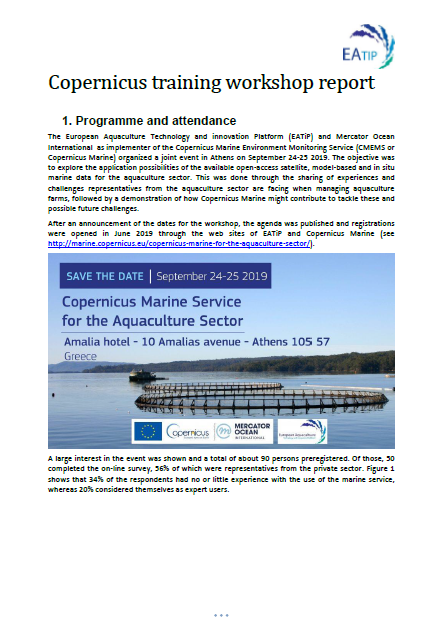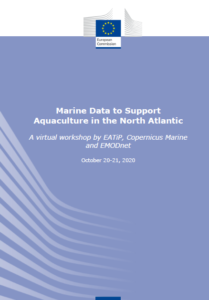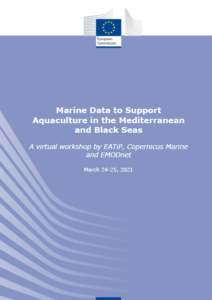EATiP joins the AAC
/0 Comments/in AAC, EU, European Commission /by David BassettFurther to today’s special General Meeting, EATiP is delighted to have been officially welcomed as a member of the AAC – the European Aquaculture Advisory Council. Commenting on the decision, the EATiP President, Gustavo Larrazábal, drew attention to the challenges and opportunities facing European aquaculture, noting: “the cutting edge research and innovation activities for which European aquaculture is justifiably highly regarded will be key in achieving the ambitions for European aquaculture production and realising the targets and objectives that the industry, civil society and regulators aspire to. EATiP stand ready to lend our support to the AAC in their deliberations and to assist wherever possible through our experience, expertise and membership network, highlighting the role that technology, research and innovation may have to play and bringing strategic research and innovation priorities to the fore in considering further development for a sustainable European aquaculture sector.”
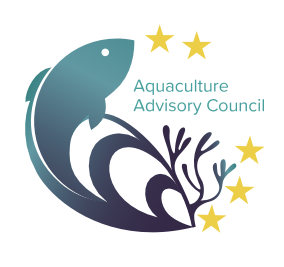
EATiP has been supportive of the establishment of the AAC from the first recommendations for such a Council to be established – as part of the reform of the Common Fisheries Policy in 2013. For some time, EATiP has been operating as an observer at AAC and further to some internal organisational readjustments in 2021, EATiP is now able to commit sufficient staff time and resources to be able to operate as a full and active member of the AAC.
A key factor in the EATiP Boad agreeing this decision was set in the context of the adoption of the Com(2021) 236 – Communication for Strategic guidelines for a more sustainable and competitive EU aquaculture for the period 2021- 2030 and Com(2021) 240 Communication on a new approach to a sustainable blue economy in the EU transforming the EU’s Blue Economy for a Sustainable Future. Within Annex 1 of the Com(2021) 236 (strategic guidelines) a number of points are referenced to the AAC where we feel EATiP will be in a position to assist and collaborate with the AAC and with the European Commission and we look forward to working proactively and productively on this.
Areas of specific interest for EATiP with regard to the AAC and the EU Strategic Guidelines inlcude:
Section 2.4 – Increasing Knowledge and Innovation
- Encourage aquaculture producers and other stakeholders to work together with research and innovation institutes and public authorities to find solutions to the challenges of the sustainable development of EU Aquaculture
- Disseminate information on research and innovation projects and their results among members
- Promote the uptake by the EU aquaculture industry of existing innovation
- Promote in the aquaculture sector the regular training of aquaculture professionals in particular on how to incorporate innovation practices.
Section 2.3 – Ensuring social acceptance and information to the Consumer
- Support and ensure the broad dissemination by members of the coordinated EU-wide campaign on EU aquaculture.
- Promote the use of digitalisation tools and artificial intelligence for the traceability and transparency of aquaculture products.Section 2.2 – Participating in the Green Transition
- Ensure that EU aquaculture producers are informed about relevant research and innovation to improve the environmental performance of aquaculture operations.
- Ensure that EU aquaculture producers are informed about relevant research and innovation on animal welfare.
- Promote the monitoring and reporting by the aquaculture industry of environmental indicators. Section 2.1 – Building Resilience and Competitiveness
- Ensure that EU aquaculture producers are informed about relevant research and innovation on animal-health and public-health matters.
- Encourage the use by the aquaculture sector of digital tools for increased traceability and transparency.
We identify many areas where EATiP will be able to support and assist these ambitions – not only through dissemination and communication with out membership and Mirror Platform Network, but also through inclusion of AAC activities and membership in our online thematic forum events and “On the Horizon” project dissemination service.
The mutual assistance that may be provided between two multi stakeholder organisations such as the AAC and EATiP towards the promotion of a sustainable European aquaculture is clear – and we look forward to a long and fruitful working relationship together!
EESC Opinion supports sustainable Aquaculture growth in Europe
/0 Comments/in BIOECONOMY, EU, European Commission, Media /by David BassettFurther to the publication in the late spring of two key Communications from the European Commission relating to European Aquaculture – on a new approach for a sustainable blue economy in the EU Transforming the EU’s blue economy for a sustainable future – and Strategic guidelines for a more sustainable and competitive EU aquaculture for the period 2021 to 2030 – further support for the sector has been announced in an opinion of the European Economic and Social Committee hearing considering these Communications.
The EESC has indicated support for the efforts and initiatives launched by the European Commission to help our sector grow and become more sustainable, expressing concern that the EU aquaculture sector is not fulfilling its true growth potential. The EESC has expressed further concerns about the fact that 65% of the aquatic products consumed in Europe come from imports.
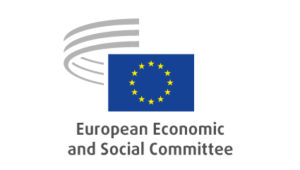
Key points from the EESC opinion include:
- Consumer choices have evolved towards a more nutritional lifestyle, with fish and aquaculture products topping the list. This represents an opportunity for significant growth in the sector, but also a responsibility to ensure future EU food security. Securing safe, healthy and sustainable food in the EU should be one of the top priorities.
- A coordinated effort from the European Commission and the Member States is needed to enhance the production capacity and profitability of the sector. Immediate simplification of administrative procedures must be complemented by high environmental standards, in order to preserve ecosystems and biodiversity, and improve quality of water. The EESC welcomes the Commission’s proposal to set up aquaculture licensing one-stop-shops in all Member States.
- The EESC considers that the right balance needs to be found between preserving the Earth’s biodiversity and meeting the necessary food requirements, taking into consideration social impact, healthy living and environmental protection. Marine and inland waters should be preserved and protected, while promoting sustainable aquaculture activities that would ensure the necessary food for the EU population.
- Space availability represents an important hurdle for the sector’s development. The EESC considers that aquaculture facilities need to be further developed, especially within coastal and rural areas across the Union, in places where other economic activities are not suitable. The EESC calls on the Member States to put in place coordinated spatial planning projects, including sea basin level planning, restoring of abandoned aquaculture facilities and big data analytics systems.
- The EESC believes that the involvement of the social partners and relevant civil society organisations in the future development strategy of the sector will create value added for the Union. They can provide both high-level expertise and excellent communication opportunities.
- The EESC considers that the relationship between the stakeholders along the value chains must be an ethical one. SMEs and start-ups should be fully supported to grow, provide high-quality jobs and create new sustainable economic models, while the public-private partnerships should benefit from financing instruments that cover long-term commitments.
- Educational and vocational training programmes can help meet the sector’s needs for a high-skilled labour force. In this regard, calls for proposals for the aquaculture sector can be financed using the European Social Fund.
- Labelling requirements have a very important role in informing consumers about the quality of aquaculture products. European citizens should be provided with trustworthy information, especially on products that come from countries with little or no legislative framework. Traceability requirements should be processed backwards, down to the hatcheries, for all products in the internal market. The final goal should be a 100% level playing field in the Single Market.
- Communication on the efforts and progress that the sector is making to ensure environmental and climate performance is paramount to ensure social acceptance and familiarise consumers with the efforts being made. Waste management systems are immediately needed for a sector that has a high potential to reduce its environmental footprint. The sector also has considerable potential to embrace circularity and renewable aquatic resources, while striving to reduce energy consumption and carbon emissions.
- Rapid and large-scale public and private investment is needed, especially in research and development activities. The Commission should promote all the relevant available EU funds and partnership opportunities through the social partners and civil society organisations networks, with the final aim of reaching all the producers, especially SMEs.
- The EESC appreciates and supports the proposal to create an EU Aquaculture Assistance Mechanism with a dedicated online platform, and considers that an Aquaculture Growth Strategy that would boost the sector’s potential is urgently needed at European level.
Developing sustainable aquaculture in the south Atlantic
/0 Comments/in All Atlantic / Brazil Platform, EU, European Commission, Events, INCO, MIPs /by David BassettEATiP, with the support of Innovation Norway and BluEcoNet, has been selected to undertake a Joint Action (JA) within the EU Horizon 2020 funded AANChOR(All Atlantic Cooperation for Ocean Research) Coordination and Support Action, considering the establishment and viability of a multi stakeholder platform for aquaculture. The JA will use Brazil as a case study, but with the clear intention for application to other south Atlantic nations, including South Africa. This JA has been selected in part to complement European Union objectives with regard to Belém Statement partners and additional accords with Argentina and Cape Verde. The JA seeks to scope the potential for self-sustaining Atlantic aquaculture multi stakeholder platform(s) in the development of national or regional Strategic Research & Innovation agenda for sustainable industry development.
By way of introducing and launching the Joint Action, EATiP is collaborating in a side event at the forthcoming All Atlantic Conference with two other Horizon 2020 aquaculture projects focusing on Atlantic aquaculture: ASTRAL and AquaVitae.
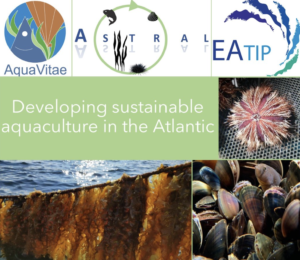
EATiP, collaborating with ASTRAL & AquaVitae to address sustainable aquaculture in the south Atlantic
ASTRAL focuses on integrated multi-trophic aquaculture (IMTA) farming, aiming to define, support, and promote this type of sustainable aquaculture production across the Atlantic area.
AquaVitae aims to increase aquaculture production in and around the Atlantic Ocean by developing new species, processes and products, focusing on low trophic species.
To register for the side event, please click on this link.
Practical Details:
- 03 June 2021
- 13:30 – 15:30 CET
- Registration Required – see link above.
“Knowledge & Innovation key”: Strategic Guidelines for EU Aquaculture – The next decade.
/0 Comments/in Education, EU, European Commission, MIPs /by David BassettEATiP welcomes the publication by the European Commission (DG MARE) of a communication on the Strategic Guidelines for a more sustainable and competitive EU aquaculture for the period 2021 to 2030.
Of particular importance to us is the clear commitment given to the objective of increasing knowledge and innovation, one of four cross cutting objectives that cover 13 areas of work identified within the Communication.
This much anticipated document takes into account the future of the aquaculture sector referenced in the context of important policy developments such as the European Green Deal and the Farm to Fork Strategy – and also takes into account the ongoing impact of the Covid-19 pandemic. Of the four cross cutting objectives identified, the remaining three consider; building resilience and competitiveness, participating in the green transition and ensuring social acceptance and consumer information.
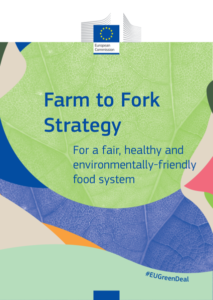
The Farm to Fork Strategy & EU Green Deal highlight the strategic potential for farmed seafood.
As the guidelines themselves note, “knowledge and innovation (including the use of digital technology) are key to achieve the other objectives [set out in the Communication] and they are especially important for building the resilience and competitiveness of aquaculture and ensuring its green transition”.
Horizon Europe, the forthcoming EU framework programme for research and innovation is set to play an important part in the realisation of these objectives. Sustainable aquaculture is identified as an important priority within Horizon Europe where it is hoped that aquaculture research and innovation will ensure a faster response to the current and future challenges and opportunities of the sector whilst avoiding a duplication of efforts and creating synergies across other research areas.
The multi stakeholder and collaborative approach is central to the function of EATiP and the development of our Strategic Research and Innovation Agenda. As the new strategic guidelines note, further efforts are suggested in several areas that are highly complementary to our aims and current working methodology. Specifically those listed in the Communication cover:
- Creating a framework for cooperation that brings together public authorities, industry, researchers, and educators, both at national and regional/local levels. This framework should include the development of innovation clusters for sustainable aquaculture.
- Fostering the development and matching of research and innovation strengths across Member States and regions. This should include smart-specialisation strategies aimed at building full value chains across the EU.
- Fostering effective dissemination of research and innovation results to industry end-users and the general public, as well as their exploitation, including by means of the close monitoring of the establishment and implementation of solid dissemination and exploitation plans of EU funded projects.
- Promoting complementarity and synergies between research projects.
- Facilitating access to EU funds for research and innovation in the aquaculture sector, by providing a clear overview of the available EU funding.
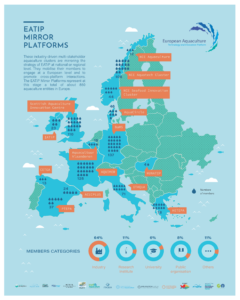
EATiP currently operates with 16 national / regional innovation clusters across 11 nations. Will the Guidelines encourage more clusters to form?
EATiP will continue to work on all these fronts and the emphasis on the development of innovation clusters is something that EATiP particularly welcome – noting the vital role that the current 16 national & regional Mirror Platforms currently play within our organisation. Welcome too is the commitment given to the setting up on an EU Aquaculture Assistance Mechanism, not only in terms of assisting in the sharing of best practice but also in the development on an online platform hosting information on EU funding and EU funded projects.
Two further significant themes also emerge from the guidelines with regard to innovation.
It is encouraging that emphasis is placed on promoting investment in innovative solutions. As the Communication goes on to note, “investors often enter unfamiliar territory when investing in innovation” and this can be particularly true for aquaculture. As such we welcome commitment that the EU’s BlueInvest initiative will continue to bring together investors and entrepreneurs in the aquaculture sector and that a financial instrument will be set up with EMFAF and InvestEU contributions which will be available to support investment in sustainable aquaculture activities and technologies. This will be in addition to that support afforded by individual EU Member States.
Finally, the key area of skills, education and training are acknowledged, and we look forward to further development of the themes referenced in the Communicaiton relating to the “promotion of specialised curricula and knowledge on aquaculture… …as well as life-long training for farmers on innovative approaches for the aquaculture sector”.
EATiP looks forward to building on our strong relations with the European Commission and other linked stakeholders in the delivery of the ambitions contained within the newly published Commuication and will ensure that technology, knowledge and innovation remain at the forefront of a sustainable European aquaculture sector. The role that EATiP and our Mirror Platforms have in the development of European aquaculture is something that we have already been discussing with the European Commission and with the publication of these guidelines and the imminent publication of both the Horizon Europe work programmes and EMFAF funding mechanism these proposals will be progressed further.
An exciting decade of innovation in European aquaculture is underway!
Mediterranean and Black Sea regional marine data for aquaculture workshop
/0 Comments/in Copernicus, EU, European Commission /by Catherine Pons
The workshop was organized by EATiP in conjunction with Copernicus Marine, EMODnet and the European Commission (DG MARE and DG DEFIS), as a follow-up of the successful event addressing environmental monitoring for aquaculture in the North Atlantic (see the report on MARINE DATA TO SUPPORT AQUACULTURE IN THE NORTH ATLANTIC). About 80 aquaculture company stakeholders, experienced data users and providers, researchers and coastal managers from across the Mediterranean and Black Sea regions gathered to explore opportunities for open source marine environmental data to support and innovate the aquaculture sector.
Both the Marine Food sector related Copernicus Marine Service and the EMODnet portfolios provide valuable marine data, services and tools that might be combined with coastal models, data networks and measurements by aquaculture farms in order to contribute to a better management and operation plans.
The objectives of the workshop and a summary of the marine data from the aquaculture industry in a set of different countries in the region are attached. Information in the latter was assembled by EATiP, its regional Mirror Platforms and by key national stakeholders, based on information from national and regional authorities that are responsible for aquaculture management and spatial planning. Both documents supported the attendants of the Mediterranean and Black Seas meeting in understanding the current of play and the expectations towards a future collaborative network for better use of current data.
Thank you to all who joined the workshop!
The report is now available here.
We’re growing again!
/0 Comments/in ETPs, EU, European Commission, From EATIP Members, Members /by David BassettEATiP is delighted to announce that EBCD – the European Bureau for Conservation Development has joined our Platform as a member organisation. EBCD is an international environmental NGO that promotes the sustainable use and conservation of marine resources.
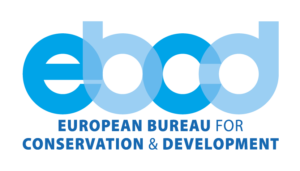 Established in Brussels in 1989, EBCD fosters dialogue and cooperation on ocean governance among all stakeholders, and works together with EU and UN institutions to advance progress on sustainable development.
Established in Brussels in 1989, EBCD fosters dialogue and cooperation on ocean governance among all stakeholders, and works together with EU and UN institutions to advance progress on sustainable development.
EBCD has a long history in engaging on sustainable fisheries & aquaculture at European and global level, tracking and informing policy developments through expert-led scientific advice and full stakeholder participation. Embracing its mission of promoting the sustainable use of natural renewable resources, EBCD was involved at the establishment of EATIP in 2007 – bringing in IUCN as an advisory body – and it has carried out several projects jointly with IUCN on aquaculture.
On becoming part of our Platform, EBCD is looking forward to contributing to the sustainable development of the aquaculture sector and in particular to supporting the achievement of SDG14 Life Below Water and SDG 2 Zero Hunger.
One of the key strengths of the European Technology Platforms is their multi-stakeholder approach, joining industry members with researchers, academics and NGO organisations. Taking a fact and science based policy approach to sustainable development is more important than ever – and such joint working demonstrates the trust and credibility that is to be found in the work of the ETPs, and the importance attached to them by the European Commission and other key stakeholders.
EBCD also provides the Secretariat to the European Parliament Intergroup on “Climate Change, Biodiversity and Sustainable Development” with a specific Working Group on Fisheries and Aquaculture as well the Secretariat to the Market Advisory Council of DG MARE and the Secretariat to the IUCN Fisheries Expert Group.
EATiP and other food sector Technology Platforms call for a more ambitious budget for Horizon Europe
/0 Comments/in ETPs, EU, European Commission /by David BassettAs part of providing the right framework for an economic recovery from the COVID-19 pandemic European Heads of State and Governments agreed earlier this week on the EU budget for 2021-2027. Whilst the Council decision provides a clear direction for a rapid decision later this autumn, the reduction in funds allocated to the next Research Program “Horizon Europe” is of concern. Investment in Research and Innovation (R&I) is fundamental to improve food security and the sustainability of EU food systems and ensure development in line with the Green Deal and Farm2Form strategy objectives.
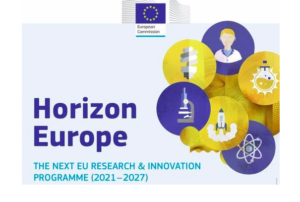
Horizon Europe – the EU Research & Innovation Programme 2021 – 2027
Together with the European Technology Platforms FABRE, Plants for the Future, TP Organics, the National Food Technology Platforms and the Animal Task Force, EATiP addresses an urgent message to the European Council, European Parliament and European Commission on the importance of R&I to support robust and resilient food, agricultural and aquaculture systems.
Read the common statement below:
 Loading...
Loading...
Marine data to support aquaculture in the Mediterranean and Black Seas
/0 Comments/in Copernicus, EU, European Commission /by Catherine Pons
Co-organised by EATiP, EMODnet, Copernicus Marine (CMEMS) and DG MARE/DG DEFIS
When? March 24-25 (tentative) (3 hour meeting each day 10:00-13:00 CET)
Where? Online: Invitation-only
Who will attend? Aquaculture industry and authorities (focus Mediterranean/Black Sea), EMODnet and CMEMS representatives, European Commission policy, some invited projects e.g. Blue-Cloud, EuroSea, FORCOAST, other…
What is the workshop about? The main goal of the workshop is to find ways to make better use of existing, free marine data and services offered by Copernicus Marine Service and EMODnet, in combination with farm data and data from coastal authorities. To achieve a common understanding and provide ideas for best practice, the workshop brings together industry practitioners in the Aquaculture sector, marine environmental data producers, coastal authorities and key open source marine data managers (EMODnet and CMEMS). The meeting is designed for maximum interaction between participants, with (online) breakout discussions led by a professional facilitator.
The October event on the North-Atlantic gathered more than 60 expert and end users of data (37% aquaculture industry, 37% policy/coastal managers, 24% researchers/modelers). Its final report is available at MARINE DATA TO SUPPORT AQUACULTURE IN THE NORTH ATLANTIC. The EC has requested a similar report for the Mediterranean / Black Sea.
We now need to identify potential participants whom we can invite to the event, and to clarify the type of data that is already monitored by aquaculture stakeholders and governing authorities. Are you interested to join or to contribute? Please let us know by the end of January. A formal invitation will then be sent out.
EATiP feedback to draft Ocean Mission
/0 Comments/in _, EU, European Commission /by Catherine PonsThe European Starfish Mission on “Healthy oceans, seas, coastal and inland waters” aims to know, restore and protect our oceans and waters by 2030. As a multi-actor platform on a European scale, EATiP strongly believes that the aquaculture sector can play a decisive role in achieving the many ambitious goals. Even more, the success of the Mission depends on the active engagement and commitment of stakeholders along the aquaculture value chain, making them accomplices to the solution.
READ the recommendations from EATiP HERE
GET INVOLVED: You can use (part) of the input to provide your feedback to the European Commission HERE
MORE INFORMATION on Missions HERE

